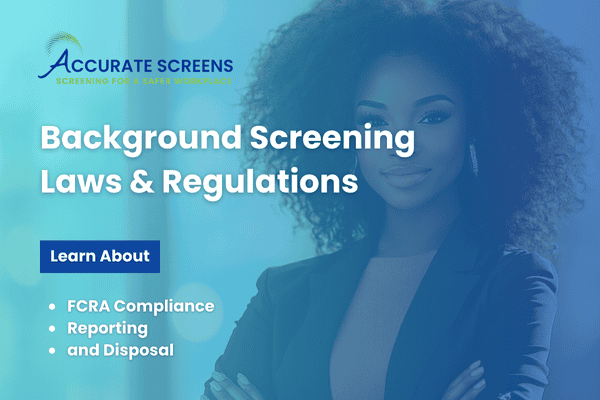In today’s competitive business environment, finding qualified workers is a top challenge for many employers. However, hiring an unsuitable candidate can be even more detrimental than having no worker at all. This is where thorough background screening becomes crucial. Employers must carefully assess job requirements, potential risks, and conduct comprehensive background investigations to ensure applicants are competent and fit for the positions they’re considering.
As a company, you must comply with federal law when using the information you obtain from a CRA (Consumer Reporting Agency) organization such as Accurate Screens to assist you in making employment decisions. The federal law that addresses your responsibilities is The Fair Credit Reporting Act (FCRA). Don’t let the title of the law fool you just because you are not extending credit to consumers.
Understanding the Fair Credit Reporting Act (FCRA)
The Fair Credit Reporting Act (FCRA) is a federal law that governs the use of consumer reports for employment purposes. Despite its name, the FCRA applies to more than just credit reports – it covers a wide range of background screening information used in employment decisions.
What are Consumer Reports?
Employment background checks, also known as consumer reports, can include information from various sources, including credit reports and criminal records. When using these reports for employment decisions – including hiring, retention, promotion, or reassignment – employers must comply with the FCRA.
Permissible Purposes for Background Checks
Before requesting a background check, ensure you have a permissible purpose. Employment is a permissible purpose, but you must have a legitimate business need related to the specific position. Accurate Screens, as a CRA, must obtain certification from you of the permissible purpose before fulfilling your request. Ordering a report on your ex or daughter’s new boyfriend is not permissible and your employees should be aware that just because they are ordering reports from us, doesn’t mean they can use the service for other purposes.
Employment is a permissible purpose. But that does not mean that because you like “John or Jane Doe’s” smile you can order information on them to see if you want to pursue them for employment. You must not only have a permissible purpose, but you must also explicitly disclose to the person that you are going to order information that could be used as a factor in your decision and get their explicit authorization to do so.
Steps to Comply with FCRA Before Requesting a Report
- Determine Permissible Purpose: Before requesting a background check, ensure you have a permissible purpose. Employment is a permissible purpose, but you must have a legitimate business need related to the specific position.
- Provide Written Disclosure: Inform the applicant or employee in writing that you might use information from their consumer report for employment-related decisions. This notice must be in a stand-alone format, separate from the employment application.
- Certify Compliance: You must certify compliance with Accurate Screens by
- notified the applicant or employee and got their permission to get a consumer report
- complied with all of the FCRA requirement
- will not discriminate against the applicant or employee or otherwise misuse the information, as provided by any applicable federal or state equal opportunity laws or regulations
Accurate Screens has obtained your written certification but our ordering system also has you make these certifications before each order. The certifications are then date-stamped and securely stored should a question arise in the future.
While the FCRA provides federal guidelines, it’s crucial to be aware of state-specific regulations that may affect the permissibility and timing of background checks. Some states have restrictions on the use of credit reports for employment purposes, while others require a conditional offer of employment before ordering a criminal record check. Accurate Screens makes a state rules register program available to you on our system so that you may review state laws by topic or, review state laws and regulations by the state. Additionally, our system is designed to automate the required state documents based on the candidate’s location, to assist you with compliance.
Handling Consumer Reports and Adverse Actions
When using consumer reports for employment decisions, it’s essential to:
- Ensure the information is job-related and consistent with business necessity
- Follow proper adverse action procedures if considering a negative decision
- Securely store and dispose of consumer report information
- Regularly review and update your background screening policies
Before you reject a job application, reassign or terminate an employee, deny a promotion, or take any other adverse employment action based on information in a consumer report, you must give the applicant or employee:
- a notice that includes a copy of the consumer report you relied on to make your decision
- a copy of a Summary of Your Rights Under the Fair Credit Reporting Act, which Accuratescreens has given to you.
Giving the person the notice in advance allows them to review the report and tell you if it is correct. There may be a need to investigate further. Some people have the same name and date of birth, have had their identities stolen, or had a court jurisdiction make a mistake.
After You Take an Adverse Action
If you have received information from Accuratescreens and determined that it is job-related, consistent with business necessity, and have gone through your pre-adverse action requirements, you must now give the applicant or employee a notice of that fact.
An adverse action notice tells people about their rights to see information being reported about them and to correct inaccurate information. The notice must include:
- the name, address, and phone number of Accurate Screens (assuming that we provided the information and that was in whole or partly responsible for the adverse action)
- a statement that Accurate Screens did not make the decision to take the unfavorable action and can’t give specific reasons for it
- a notice of the person’s right to dispute the accuracy or completeness of any information we furnished
- and to get an additional free report from Accurate Screens if the person asks for it within 60 days.
Special Considerations for Investigative Reports
If you use “investigative reports” you have additional obligations under the FCRA. These obligations include giving written notice that you may request or have requested an investigative consumer report, and giving a statement that the person has a right to request additional disclosures and a summary of the scope and substance of the report. (See 15 U.S.C. section 1681d(a), (b)).
An “investigation report” is “a consumer report or portion thereof in which information on a consumer’s character, general reputation, personal characteristics, or mode of living is obtained through personal interviews with neighbors, friends, or associates of the consumer reported on or with others with whom he is acquainted or who may know any such items of information. However, such information shall not include specific factual information on a consumer’s credit record obtained directly from a creditor of the consumer or from a consumer reporting agency when such information was obtained directly from a creditor of the consumer or from the consumer.
Proper Disposal of Consumer Reports
When you’re done using a consumer report, you must securely dispose of the report and any information you gathered from it. That can include burning, pulverizing, or shredding paper documents and disposing of electronic information so that it can’t be read or reconstructed. For more information, see Disposing of Consumer Report Information.
Summary
While compliance with background screening laws and regulations may seem daunting, it’s essential for protecting both employers and job candidates. The FCRA provides a framework that balances the needs of businesses with the rights of individuals. By partnering with a knowledgeable Consumer Reporting Agency like Accurate Screens and staying informed about legal requirements, employers can make confident, compliant hiring decisions that contribute to a safe and productive workplace.


